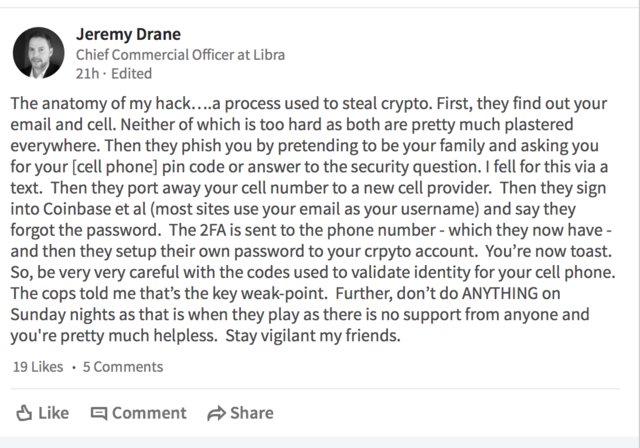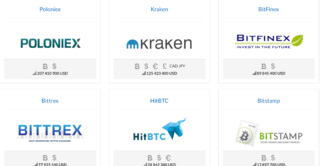Protecting your Bitcoin is the best consumer protection
If you're an active digital currency user--whether as a holder, investor or someone who uses it to transact---find smart, best practices to protect your funds. The risk of not protecting your funds goes up with the size of your crypto holdings. Why? Some compelling reasons below:
Hack
Hacks can come a lot of different angles--including phishing methods directed at individual or exchanges (intermediary). Here's a recent victim worth sharing:
Issue:

Source: https://www.linkedin.com/feed/update/urn:li:activity:6291098632758317056/ Solution:
For the person above, a better form of 2nd factor authentication could be Google Authenticator app. This would only be vulnerable if the hacker has direct possession of your phone/device. Beyond that, the optimal method is cold storage, meaning a hard wallet, a device disconnected from the Internet like a Trezor or Ledger Nano S.
Pending Bitcoin hard fork
Issue: On August 1st, there will be an upgrade to the Bitcoin protcol (known as a hard fork). No one can perfectly forecast what scenario will play out. On the downside, there may be a disruptive split into two paths of Bitcoin, which would result from disagreements among nodes or users in making upgrade to the latest version of the protocol software. Leading up to the event, there'll likely be price volatility on exchanges driven by customers buying and withdrawing funds. When the event occurs, it's unclear how and if the crypto exchange(s) are prepared to protect customer funds.
Solution: move your Bitcoin holdings off the exchange onto a cold storage, hard wallet, or even a paper wallet, until you're confident the cloud of uncertainty has passed.
Exchanges are vulnerable
Issue: It's no secret crypto exchanges can be vulnerable, and customers ultimately bear the brunt if there no customer protections in place.
Types of risks with exchanges: operational (e.g. network issues, scalability), reputational (poor customer support, hacks, lack of transparency), liquidity (liquidity run as investors pull out), and solvency. Though Mt. Gox had all of those risks, all exchanges on some levels potentially face the same risks if proper measures aren't in place to mitigate those risks.
Solution: leave some funds in your account on exchanges to support your active buying/selling activities, but keep the rest of your holdings off the exchange on a hard wallet (protecting your private key offline), paper wallet or other form of cold storage.

Bottom line: Securing your funds is the best form of consumer protection. You can't rely on exchanges or external regulators as a first line of defense for your crypto holdings.
My video commentary
Great article - I've met a handful of people who held on exchanges (over cold storage) and lost BTC.
It's so important to understand these risks!
Great posts. Security and privacy is great concern when it comes to using crypto currencies.
A family member asking for a PIN code and then sending it by text. Is this serious?